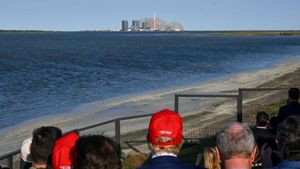Rick Scott is facing significant political challenges as he campaigns for re-election this November, sharing the ballot with two contentious initiatives: one addressing abortion and another involving cannabis legalization.
The senator has publicly opposed both measures, emphasizing their potential impact on Florida's social fabric, yet he's remained vague about how he plans to mobilize efforts to defeat them.
Speaking to the Duval County Republican Party, Scott stated, “I’m going to do everything I can to make sure these don’t pass,” demonstrating his commitment to the cause even without detailing his strategy.
His opposition stems from beliefs he articulated concerning the abortion amendment, calling it “extreme,” arguing against what he perceives as Democratic overreach on the issue.
Scott's definitive stance includes the assertion, “They support allowing a healthy baby born alive to die just by leaving him in the corner,” illustrating his vehement resistance to the initiative aimed at restricting abortion rights.
On the marijuana front, he shared personal ties to the drug, describing it as “a gateway drug,” and referenced the tragic death of his brother, whose struggles began with marijuana.
Scott’s hesitancy to specify how he would combat these amendments aligns with his political narrative, which often seeks to resonate with conservative constituents who may feel their values are under siege.
Florida's voting atmosphere is complex, as both proposals require at least 60% approval to pass, and recent polls indicate they are too close to call.
The Florida Atlantic University’s PolCom Lab reports the abortion amendment enjoys 56% support, hinting at mixed sentiments among the electorate.
Interestingly, additional polling from USA Today/Suffolk University suggests the cannabis amendment could potentially achieve 63% backing, indicating significant public interest.
Florida has become a battleground for these issues, drawing attention from both local and national media as Scott’s responses are scrutinized.
While Scott is vocal about his opposition, the ambiguity around his strategies raises questions among his supporters and critics alike.
Many political experts highlight the importance of addressing these initiatives carefully, as they signal shifting values among Florida voters.
Meanwhile, local political dynamics are evolving, with candidates forming varied alliances to influence public perception and turnout.
Scott’s approach may be indicative of larger trends within the Republican Party, as they seek to navigate increasingly polarized social issues.
Beyond the immediate election, the strategies adopted by candidates like Scott could have lasting ramifications on Florida’s political climate going forward.
Political newcomers to Wyoming also indicate shifts within political landscapes, as individuals who previously resided in more liberal states look to reinvent their identities within the local conservative framework.
Many of these newcomers label themselves as “political refugees” with ambitions to reshape Wyoming's political identity based on their values and experiences.
This trend sparks concern about political entrenchment; as these individuals seek familiar ideologies, they may inadvertently sow division within their new communities.
For example, Tom Olmstead, who left Colorado, argues he is representing truly conservative values and launched his campaign against sitting Senator Ed Cooper.
Olmstead’s perspective reflects broader anxieties existing among conservative voters, who feel inadequately represented by current leaders.
This sentiment resonates with many other transplants who view Wyoming’s political scene through the lens of their previous frustrations with more left-leaning governance.
At the same time, traditional campaign tactics persist, with local candidates clinging to their roots as they attempt to build trust with constituents.
Cooper’s campaign emphasizes his long-standing local ties, mirroring strategies previously successful for politicians like Harriet Hageman.
Such dynamics paint a nuanced picture of how newcomer energy interacts with entrenched political traditions within the state.
With changes underway, they reflect a microcosm of broader national debates over identity, governance, and representation.
The clash between established political figures and newer voices is indicative of mounting pressures as regional issues take center stage against the backdrop of national trends.
Beyond rhetoric, the outcomes of upcoming elections could reshape not just individual careers but also the political terrain of states involved, including Florida and Wyoming.
Both Scott’s campaign and the influx of political newcomers to Wyoming signal evolving landscapes, raising questions about voter alignment and ideological purity.
With voter sentiment steadily shifting, candidates must adapt to maintain relevance and reflect the values of their constituents.
While some may view these tensions through the lens of individual candidates, they also echo larger political narratives evident across the nation.
From Scott's dogged opposition to the contentious issues on Florida ballots to the bolstering of new candidates within state contests, the political narrative is one of contention and transformation.
These developments come at pivotal moments as states confront pressing issues, reinforcing the need for candidates to navigate complex landscapes with sensitivity and foresight.
The political chatter around abortion and cannabis legalization showcases how specific local issues can galvanize broader conversations about governance and representation.
So, as November approaches, both Scott and the new Wyoming candidates will have more than just their campaigns on the line; they will fundamentally shape the discourse surrounding foundational American values within their states.
This period holds the potential for not only immediate electoral change but lasting political transformations as voter engagement continues to evolve.



